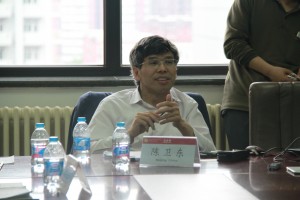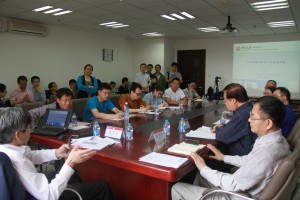Macro-Finance Salon (No. 31): RMB Internationalization and Offshore Market Pricing
2016-05-08 IMI Mr. Wei Benhua mentioned that the “8.11 reform” is just a momentary factor of the slowdown of RMB’s internationalization, of which the connation needs a deeper discussion. He reviewed the basic situation of the “7.21 reform” and the “8.11 reform” and pointed out the necessity of financial market’s reform. He hoped the attendants can give a consideration to those problems: What should the next step of the reform of exchange rate be? Whether will the internationalization of RMB be affected by the open of capital market? How to make use of the competiveness of Chinese enterprises? How to promote the development of offshore market?
Prof. Zhao Xijun held that after the “8.11” reform, what lies behind the possible two-way fluctuation of RMB’s internationalization are the changes in the speed of economic growth and structure. He thought different viewpoints concerning the impact of RMB’s internationalization on exchange rate formation mechanism and open of capital account.
Mr. Wei Benhua mentioned that the “8.11 reform” is just a momentary factor of the slowdown of RMB’s internationalization, of which the connation needs a deeper discussion. He reviewed the basic situation of the “7.21 reform” and the “8.11 reform” and pointed out the necessity of financial market’s reform. He hoped the attendants can give a consideration to those problems: What should the next step of the reform of exchange rate be? Whether will the internationalization of RMB be affected by the open of capital market? How to make use of the competiveness of Chinese enterprises? How to promote the development of offshore market?
Prof. Zhao Xijun held that after the “8.11” reform, what lies behind the possible two-way fluctuation of RMB’s internationalization are the changes in the speed of economic growth and structure. He thought different viewpoints concerning the impact of RMB’s internationalization on exchange rate formation mechanism and open of capital account.
 In the Q&A session, Dr. Chen answered the questions regarding appreciation and two-way fluctuation of RMB, the driving engine of China’s economic development, the impact of RMB’s internationalization on banks, linkage between issuance of currency and the interest rate conducting system, way to make use of the internationalization of RMB.
In the Q&A session, Dr. Chen answered the questions regarding appreciation and two-way fluctuation of RMB, the driving engine of China’s economic development, the impact of RMB’s internationalization on banks, linkage between issuance of currency and the interest rate conducting system, way to make use of the internationalization of RMB.
